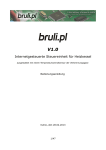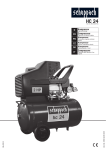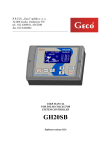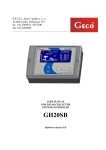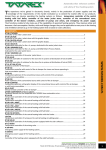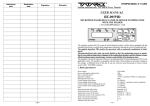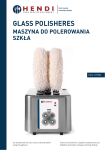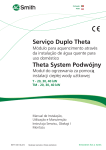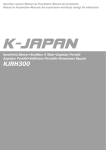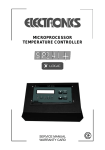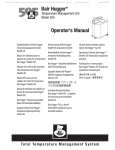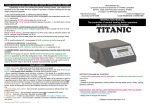Download User Manual EN
Transcript
eCoal.pl V2.1 Adaptive Controller licensed by the Institute for Chemical Processing of Coal User Manual Kutno, 28/03/2013 1/59 List of contents 1.Foreword......................................................................................................9 1.1.Intended use..........................................................................................9 1.2.Algorithm - Group Combustion..................................................................9 1.3.Group combustion histogram..................................................................11 1.4.Specification.........................................................................................12 2.Safety........................................................................................................13 3.Installation.................................................................................................14 3.1.Environmental conditions........................................................................14 3.2.Installation of a control panel..................................................................14 3.3.Connecting measuring sensors................................................................15 3.4.Connecting room thermostat...................................................................16 3.5.Connecting sensors to external alarm input...............................................16 3.6.Connecting control devices.....................................................................17 3.7.PC connection.......................................................................................17 3.8.Ethernet connection...............................................................................18 4.Controller operation.....................................................................................19 4.1.Control panel - keyboard........................................................................19 4.2.Control panel - Maintenance level............................................................20 4.3.Controller operation modes.....................................................................22 a)Manual mode.......................................................................................22 b)Automatic mode...................................................................................22 4.4.Central heating temperature setting.........................................................23 4.5.Domestic hot water temperature setting...................................................23 4.6.Function - fuel charge............................................................................24 5.Controller programming................................................................................24 5.1.Combustion parameters.........................................................................24 a) Parametry spalania (Combustion parameters) – typ Tłokowy (Ram type) ręczny (Manual).......................................................................................25 b) Parametry spalania (Combustion parameters) – typ Tłokowy (Ram type) grupowy (Group)......................................................................................26 c) Parametry spalania (Combustion parameters) – typ Tłokowy (Ram type)eCoal (eCoal)...........................................................................................27 d) Parametry spalania (Combustion parameters) – typ Zasypowy (Hopper type) .............................................................................................................28 5.2. Parametry użytkownika (User parameters)...............................................29 5.3.Programmers........................................................................................30 a)Programator CO (CH programmer)..........................................................32 b)Programator CWU (DHW programmer)....................................................32 c)Programator pogodowy (Weather compensation programmer)....................32 d)Programator pokojowy (Room programmer).............................................33 e)Programator pompy cyrkulacyjnej (Circulation pump programmer)..............34 f)Programator Auto-Lato (Automatic summer programmer)..........................34 g)Programator ogrzewania podłogowego (Floor heating programmer).............34 5.4.Internet...............................................................................................35 5.5.Data i czas (Date and time)....................................................................36 5.6.Parametry zaawansowane (Advanced parameters).....................................36 6.Alarms.......................................................................................................39 7.Proxy software - eCoal.pl..............................................................................40 7.1.Controller software update......................................................................41 2/59 7.2.Controller connection to local network......................................................45 7.3.Setting local network parameters in the controller......................................46 7.4.Website panel in the controller................................................................48 7.5.Connecting controller to remote access service..........................................52 7.6. Sharing controller with other user...........................................................57 3/59 Visit our websites http://eCoal.pl http://eSterownik.pl The websites include: •Answers to the frequently asked questions – FAQ •Latest version of eCoal.pl controller software •Latest version of eCoal.pl controller website •eSterownik.pl website developed for eCoal.pl users provides Remote Access to the controller via Internet, if no public IP is available. A proxy server allows communication, if no public IP address is available. •User Forum •Software test builds are available on the Forum 4/59 eCoal.pl software - Version history Version 0.3.1.6: • Added: new 30 kW power for Spalanie Grupowe (Group combustion) • Changed: error causing feeder operation time reset following controller reset Version 0.3.1.4: • Added: new combustion algorithm - Spalanie Grupowe (Group Combustion) • Added: manual combustion process control - two-state operation • Added: manual hopper type boiler operation (emergency grate combustion) • Added: automatic feeder and blower OFF in manual mode • Added: blower and feeder ON in manual mode with the following alarm: Uszkodzony czujnik temperatury spalin (Flue gas temperature sensor failure) • Added: floor heating pump switches to cyclic operation at set temperature • Added: floor heating pump OFF at CH temperature 4 °C below Temp.MIN.CO (min. CH temperature) • Added: floor heating pump OFF in LATO (Summer) mode • Added: new alarm - Wysoka temp. podajnika (High feeder temperature) - activated 5 °C below Max temp.podajnika (Max. feeder temperature) • Added: emergency CH pump OFF at temp. MAX (max. temperature) set in Ust.zaawansowane (Advanced settings) • Changed: simplified DHW priority - CH/floor heating pump always OFF in DHW priority mode • Changed: removed prolonged operation time after pre-set temperature reduction • Changed: reduced idle time in sustain mode to 5 minutes (for pellet only) • Changed: mixing pump may activate, if CH temperature is higher than return temperature by 1 °C • Changed: CH pump will activate 2 °C below minimum temperature • Changed: DHW pump will activate 2 °C below minimum temperature • Changed: floor heating pump will activate 2 °C below minimum temperature • Amended: sustain cycle activated after 5 minutes following controller reset • Added: website prompts • Added: graph display of a single readout when clicking temperature value on the diagram • Added: graph settings stored in browser cookies • Added: feeder idle time statistics for group combustion - Histogram on the website • Added: parameter preview on the graph • Added: local web server file buffering • Added: automatic fuel consumption calculation based on feeder operation time • Added: logging fuel quantity after feeder operation time reset (LCD panel and website) 5/59 • Added: winter/summer operation mode logging after new fuel charge The data will be automatically transmitted to eSterownik.pl • Added: automatic entry on new fuel charge on eSterownik.pl after feeder operation time reset via LCD and website • Changed: improved SD card data readout speed • Added: new parameter - Korekta mocy dmuchawy w grzaniu (+-6%) (Blower power correction in heating mode) • Added: new parameter - Okres rejestracji (Logging period), defines data logging period: 60 sec, 30 sec, 20 sec, 10 sec. • Added: new parameter - Priorytet CWU (DHW priority) - individual DHW priority function - mode removed from Tryb pracy CWU (DHW operation mode) • Added: new parameter - Temp. zał. pompy mieszającej (Mixing pump activation temperature) • Added: new parameter - Temp. zał. pompy cyrkulacyjnej (Circulation pump activation temperature) • Added: new parameters - Czas pracy/postoju dla pompy podłogowej (Floor heating pump operation/idle time) • Added: new parameter - Algorytm wygaszenia kotła (Boiler put out algorithm) (Nieaktywny, tylko grzanie, tylko podt., aktywny) (Inactive, heating only, sustain only, active) • Added: new parameter - Podbicie temp.CO przy aktywnym priorytecie CWU (CH temperature increase in DHW priority mode) • Added: new parameter - Czas wyrzutu paliwa z podajnika (Fuel removal time from the feeder), active Zapłon paliwa (Fuel ignition) alarm • Changed: 5 °C temperature setting step removed for reg.pogodowego (Weather compensation programmer) • Changed: ilość powtórzeń w podtrzymaniu (repeats in sustain mode) increased to 5 • Changed: pracy/postoju pompy CO (CH pump operation/idle time) increased from 60 min to 99 min with reg.pokojowy (room thermostat) active • Changed: Max.temp podajnika (Max. feeder temperature) parameter range (40...110 °C) • Added: temperature sensor readout averaging • Added: status field on LCD for floor heating temperature sensor - T.PODLG • Added: 'P’ marking on the display indicating priorytet CWU (DHW priority) mode active • Added: 'T' - Termostat (Thermostat) active, and 'K' - Reg.pokojowy (Room thermostat) active • Changed: PIN prompt for Parametry zaawansowane (Advanced parameters) menu • Added: new parameter - Praca automatyczna pompy cyrkulacyjnej w trybie ręcznym(Circulation pump automatic operation in manual mode) Version 0.2.8.1: • Changed: error causing 5 sec feeder operation in heating mode after each controller reset Version 0.2.8.0: 6/59 • Added: information display on the web site, that the controller is in LATO (Summer) mode (important information in Auto-Lato (Automatic summer) mode • Added: Typ kotła (Boiler type) parameter. Change in parameter does not restore factory settings. • Added: set temperature logging for reg.pokojowy (Room thermostat) - graphs • Added: set temperature logging for reg.podłogówki (Floor heating thermostat) - graphs • Added: additional parameters for Alarm zewnętrzny (External alarm): Opóźnienie (Delay), Inwersja wejścia (Output inversion), Zatrzymanie sterownika (Controller OFF) • Added: parameter - Funkcja pompy mieszającej (Mixing pump function): Mieszająca (Mixing), Cyrkulacyjna (Circulation), Podłogowa (Floor heating) • Added: Programator Pompy Podłogowej (Floor heating pump controller) • Added: parameter - Funkcja wyjścia pompy CWU (DHW pump output function): CWU, CWU + pompa mieszająca (DHW, DHW + mixing pump). This function enables use of DHW pump as a mixing pump. • Added: DHW pump operation mode on the website depending on if DHW pump is activated based on DHW algorithm (green) or mixing pump algorithm (yellow) • Added: new DHW operation modes: AutoLato-temp (Automatic summer - temperature), AutoLato-programator (Automatic summer - programmer) • Added: Auto-Lato (Automatic summer) mode programmer • Added: factory settings restored by pressing ESC during power on. • Added new parameter - Histereza dla reg.pokojowego (Hysteresis for room thermostat) (Range: 0.1 - 2.0 °C) • Added new parameter - Histereza trybu Auto-Lato (Automatic summer mode hysteresis) (Range: 0.5 - 5.0 °C) • Added new parameter - Czas pracy podajnika w grzaniu (Feeder operation time in heating mode) (Range: 3 - 20 sec) • Added: sustain cycle is activated after each controller fadeout/reset • Added: parameter - Niezależna praca pompy mieszającej (Independent mixing pump operation). If parameter is active, mixing pump operates independently from the CH pump (all modes) • Added: boiler put out in sustain mode - Wygaszenie kotła (Boiler put out) alarm is generated when the flue gas temperature will not rise by 5 °C in the sustain mode • Added: new boiler type - PELLET (Pellet) • Limited: number of feeding cycles in sustain mode to 5 steps • Removed: limited to 45 days at planning next fuel charge • Changed: Histereza CWU (DHW hysteresis) parameter resolution to 0.1 °C • Changed: CH pump activation in summer mode above 80 °C, pump deactivation 5 °C below • Changed: DHW pump activation in summer mode above 70 °C, pump deactivation 5 °C below • Mixing pump operates depending on CH pump operation. Pump deactivation temperature 3 °C below minimum temperature (not less than 39 °C), activation temperature 0.5 °C above minimum temperature 7/59 • Czas postoju pompy cyrkulacyjnej (Circulation pump idle time) reduced to 0 min circulation pump may operate in continuous mode. • Parameter update for Ogniwo EKO+ 16kW boiler • Analiza wygaszenia kotła w grzaniu (Boiler put out analysis in heating mode) Wygaszenie kotła (Boiler put out) alarm is generated in heating mode, if flue gas temperature falls below 50 °C and is maintained for at least 30 minutes • Reduced: blower power in sustain mode to 30% • Solved: problem with delayed switching to heating (room thermostat) • Improved: SD card compatibility Version 0.0.2.4: • Added: Feeder operation time counter. Feeder operation time is displayed on the operator panel in position 4 (press ↓ arrow down 3x) - “CP.POD:” field. After feeding fuel to the hopper, hold → (right arrow) or ← (left arrow) to reset the time. Time may also be reset via our website: Ustawienia użytkownika (User settings), Wyzeruj (Reset) button • Added: Indication of low fuel level in the hopper based on determined feeder operation time. Feeder operation time may be set via our website: Parametry użytkownika (User parameters), Czas do opróżnienia zasobnika [min] (Time to empty hopper [min]) field. • Added: Logging new fuel batch data in alarms and events. • Added: Anticipated date of the next coal charge. Algorithm calculates date based on defined hopper emptying time. The date is displayed after the next charge following feeder operation time reset. • Added: Factory parameters for OGNIWO EKO PLUS 16kW boiler • Improved: communication with Zdalny Dostęp (Remote access) service Version 0.0.2.0: • Added: Zdalny Dostęp (Remote access) service – http://eSterownik.pl • Added: Languages: Polish, English, German, Czech • Added: New advanced parameters: Tryb pracy pompy CO (CH pump operation mode), Czas pracy pompy CO (CH pump operation time), Czas postoju pompy CO dla regulatora pokojowego i termostatu (CH pump idle time for room thermostat and thermostat) • Added: Alarm zewnętrzny (External alarm) via binary controller input: KONT • Added: Two new advanced settings parameters: Auto (Automatic) mode • Lato (Summer) (ON/OFF) and Temp.zew (External temperature) for Auto mode • Lato (Summer) – automatic switching to LATO (Summer) mode after exceeding set external temperature. • Added: New user parameter: Regulator temp.wewnętrznej (External temperature thermostat) to select temperature adjustment in the room: Wyłączony (OFF), Prog.Pokojwy (Room thermostat), Termostat (Thermostat). Separation of room and boiler thermostat enable operation of two thermostats. • Changed: Zadawanie temperatury (Temperature setting) parameter for Regulator temperatury kotła (Boiler thermostat). Options: Prog.CO (CH thermostat), Prog.Pogodowy (Weather compensation programmer). Separation of room and boiler thermostat enable operation of two thermostats. 8/59 • Changed: User parameters – Przywracanie ustawień fabrycznych (Restore factory settings). Restore settings for a specific boiler power (15 kW, 25 kW, 35 kW). • Changed: CH pump operation time in DHW priority mode: 5/30 min 1.Foreword eCoal.pl is an adaptive controller developed with the research department of the Institute for Chemical Processing of Coal and Elektro-System S. C. industrial automatics and IT company. The essence and innovativeness of controller operation consists in ensuring continuous boiler combustion process by simultaneous operation of two regulators - one controlling fuel quantity depending on power and second controlling air quantity for optimum combustion process. The controller features flue gas temperature measurement, also used as a flue gas analyser to determine optimum air supply for fuel combustion. The combustion parameters are automatically selected without additional service or maintenance required. 1.1.Intended use eCoal.pl controller is intended for automatic supervision of central heating boiler with an automatic screw feeder and a blower. It may also be used to control domestic hot water (DHW) pump, and in a systems fitted with a mixing pump it maintains minimum return water temperature. The controller can also supervise fuel feeder operation: fuel ignition (back burning). eCoal.pl is compatible with the eSterownik.pl platform. The web interface allows for intuitive change of operation parameters. It also allows controller software update. The latest software version is available on http://eCoal.pl and eSterownik.pl forum. 1.2.Algorithm - Group Combustion Burning solid fuels in a boiler with an automatic burner is a complex process, both in respect of low fuel uniformity, e.g. particle size, and variable physical and chemical parameters, essential for combustion processes. 9/59 Coal is an especially problematic fuel, whose properties depend not only on its origin - a coal mine, but also on the specific coal bed. Coal fuel combustion in automatic boilers is a stochastic process. In commonly used solutions, fuel feeding and combustion are considered as continuous processes. It means that the feeder operates in regular and repeatable operation/idle cycles, and its power changes depending on operation and idle time ratio, which does not affect repeatability. The disadvantages of continuous fuel feeding and combustion processes, include issues with fuel to air ratio due to a stochastic nature of the combustion process, and the fact that feeding fuel batches in small intervals does not allow complete assessment of the combustion process. Significant increase in fuel feeding interval must be related with significant increase in batch feeding time to reach required power, causing temporary incomplete combustion in form of a smoke. Based on the combustion process testing in automatic solid fuel boilers, fuel batching, and therefore impulse (discrete) combustion process allows to asses, if the combustion process of a previous batch been completed. Treating the fuel batching process, and therefore the combustion process, not as a continuous but as an impulse process is revolutionary innovation. Realization of a new control method consists in group repeating of fuel feeding and short feeder idle time cycles, following a long interval to complete combustion of the previous fuel batch, and the moment of complete combustion is determined based on flue gas temperature trend analysis. 10/59 Fig. 1: Comparison of group and standard combustion processes 1.3.Group combustion histogram Histogram is a graphical representation of the distribution of data. It is shown as adjacent rectangles on the coordinate axis. The rectangle sizes are determined by class intervals (see: distribution series), with height determined by the size. In this case, feeder idle times with 10 s resolution are grouped on the X-axis. The higher the rectangle, the more often the specific idle time have occurred. Shorter idle times are grouped on the left side of the histogram, and longer idle times are grouped on the right side. Idle times depend on blower rate - the higher the blower speed, the faster the combustion process (rectangles on the left side of the histogram), the lower the blower speed, the slower the combustion process (rectangles on the right side of the histogram). Idle time may not be too short - excessive combustion rate (left side of the 11/59 histogram) or too long - low combustion rate (right side of the histogram). Distribution of the rectangles on the histogram shows the operation of a group combustion algorithm. If high rectangles are on the right side of the histogram, it means that the algorithm does not detect fuel combustion in set time and indicates low air supply. The data can be used to set the blower power in the group combustion process, it will not replace observation of a furnace, soot and coal deposits. Histogram is a visualisation of group combustion algorithm only. Fig. 2: Histograms on the website 1.4.Specification Power supply..................................................230V~50Hz Protection rating.............................................IP40 Electrical protection class ................................I Allowable ambient temperature ….....................5 °C to 45 °C no condensation Feeder circuit load .........................................up to 0.8 A Blower circuit load..........................................up to 0.8 A Pump circuit load............................................up to 0.8 A Fuses.............................................................4 A 12/59 2.Safety • Read the warranty terms and conditions and User manual before installation. Incorrect installation, operation and maintenance will render the warranty void. • Assembly and installation works shall be carried out by the service centre or personnel with proper qualifications and authorization, in accordance with current regulations and standards. • Due to the operation safety, and mains electromagnetic interferences which may affect operation of the controller and other devices, connect the controller to the socket with an earthing pin. • Do not expose controller to water and excessive humidity resulting in condensation (e.g. rapid ambient temperature changes). • Do not expose controller to temperature above 45 ºC and below 5 ºC. • In case the auxiliary grate is used to fire wood or wastes, remove flue gas sensor from the flue, if the emergency grate combustion mode is not active (Parametry zaawansowane (Advanced parameters) – Typ podajnika: Zasypowy (Feeder type: hopper)). • Wiring must be fixed on the entire length and must not contact water jacket or flue gas conduits. • Disconnect mains plug before connecting/disconnecting devices supplied by the controller. • During the storm, the controller must be disconnected from 230 V mains. • The system must be protected with fuses with a correct rating in accordance with current standards and regulations. • Do not install the controller with damaged housing or wires. • All repairs must be carried out by an authorized service centre. In other case, the warranty is void. • Flue gas sensor requires cleaning at least once a month. • The flue gas must be fitted in the middle of the flue diameter. • In case the sensor cable length exceeds 5 m, shielded cable pairs are 13/59 recommended. Cable shield must be connected to PE terminal on the controller side only. 3.Installation Assembly and installation works shall be carried out by the service centre or personnel with proper qualifications and authorization, in accordance with current regulations and standards. 3.1.Environmental conditions Do not expose controller to water and excessive humidity resulting in condensation (e.g. rapid ambient temperature changes). Do not expose controller to temperatures above 45 ºC and below 5 ºC. 3.2.Installation of a control panel An LCD housing is snap fastened. Lead a cable through a gland in a bottom part of the LCD housing. Connect on end of the cable to a screw terminal on the display board and lead the other end through the gland in the controller housing, and connect to a suitable terminal. Connect in accordance with the following colour codes: • GND – white • B – yellow • A – green • +12V – brown Recommended cable: LIYY 4x0.25 mm2. 14/59 3.3.Connecting measuring sensors Activation of connected devices and controller functions is automatic and depends on connection of temperature sensors to the controller. E.g. connecting DHW temperature sensor activates DHW pump operation, and connecting external temperature sensor allows automatic use of a weather compensation programmer etc. The sensors must be connected to the controller in accordance with the markings on the printed circuit board, by leading the sensor cable via a correct cable gland (description on the housing). KTY-81-210 type and PT-100 type temperature sensors are used. If the sensor is not connected, it is signalled with dashes by the sensor marking. Fig. 3: Terminal strip for sensors The controller may detect damaged sensors. Disconnect mains plug before connecting/disconnecting sensors to the controller and disconnect mains plug each time. In case the sensor cable length exceeds 5 m, shielded cable pairs are recommended. Cable shield must be connected to PE terminal on the controller side only. 15/59 3.4.Connecting room thermostat Room thermostat (external device, e.g. Auraton) must be connected to the controller board to TERM terminals. The thermostat connected to the controller shall be fitted with potential free contact. In case the room thermostat is connected, CH temperature is set by switching the contacts on the boiler: daily comfort (contact closed) or reduced (contact open). The option may be selected in Ustawieniach użytkownika (User settings) - Regulator temperatury wewnętrzny: Termostat (Internal temperature controller: Thermostat). Higher boiler temperature is set with thermostat contacts closed. With contacts open, set temperature is lowered, also CH pump may operate in cyclic or continuous mode or can be switched OFF - set in Parametry zaawansowane (Advanced parameters) – Tryb pracy pompy CO. 3.5.Connecting sensors to external alarm input The controller enables connection of potential free external sensors (e.g. hopper hatch open sensor, CO sensor, CO2 sensor etc.) to Alarm zewnętrzny (External alarm) input (see Fig. 3). In Ustawienia zaawansowane (Advanced settings) menu, user can set the controller response to input activation: czas opóźnienia (delay time), inwersja wejścia (input inversion) and zatrzymanie sterownika po zadziałaniu alarmu (controller OFF after alarm activation). 16/59 3.6.Connecting control devices The controller can be connected to the following devices: • Blower • Feeder • CH pump • DHW pump • Mixing pump, circulation pump or floor heating pump Connections shall be made in accordance with markings on the housing. Fig. 4: Housing wall with power outputs 3.7.PC connection The PC is connected with cable included. The PC shall be fitted with RS232 connector (DB9 socket). Optional RS232/USB adapter is available. 17/59 Fig. 6: RS232 cable Fig. 5: RS232 connector 3.8.Ethernet connection Controller shall be connected to the Ethernet with UTP network cable (PATCH CABLE) with RJ45 plug. The controller must be connected to local network switch or router. Set IP address, mask and default gateway in the controller. The options are available in Internet menu. Fig. 7: Ethernet RJ45 connector 18/59 4.Controller operation 4.1.Control panel - keyboard LCD panel features LCD, keys and LED indicators. Green LED indicates operation of the devices supplied by the controller. Red LED indicates alarm. Four arrow keys enable menu navigation and change of value. The following function keys are available: OK (Enter) - to select operation level, settings menu, and confirm changes. Press OK to select maintenance level or enter settings menu by holding the key for approx. 1 sec. The second function key is (Esc). Press to exit the menu, cancel selected or set parameters. Feeder operation indication Blower operation indication CH pump operation indication DHW pump operation indication Alarm indication 19/59 4.2.Control panel - Maintenance level After connecting power supply to the controller, software version screen is displayed. The main screen includes information on measured and set CH and DHW temperature (if DHW option is active and sensor connected). The main screen also shows information on boiler operation mode (top line): • R – manual operation • C – automatic operation – temperature set by CH programmer • P – automatic operation – temperature set by weather compensation programmer • K – room regulator active • T – room thermostat active At DHW temperature (bottom line) in manual mode, R indication is showed (manual mode). In the automatic mode, the following marks indicate DHW temperature adjustment mode: • N – winter mode – normal DHW pump operation • P – DHW priority mode – DHW pump priority • L – summer mode – domestic hot water pump operation only. • Z – automatic summer temperature mode - switching winter/summer mode depending on external temperature • G – automatic summer programmer mode - switching winter/summer mode depending on programmer setting 20/59 Set temperature Measured temperature Temperature reduction Temperature setting for CH regulator The main screen shows data for boiler operation at reduced temperature. It is indicated by a down arrow next to CH and DHW set temperature. No arrow indicates normal temperature. Disconnecting DHW temperature sensor from the controller, deactivates DHW pump. A row of dashes next to DHW description indicates no active DHW option. The sensors must be disconnected with the controller OFF. At the maintenance level, the temperature measured by the sensor can be verified. Press up and down arrows to scroll. Item Symbol Description 1 CO (CH) CH temperature – measured and set 2 CW (DHW) DHW temperature – measured and set 3 T.WEW (Internal temperature) Internal temperature 4 T.ZEW (External temperature) External temperature 5 POWROT (Return) Return temperature 6 SPALINY (Flue gas) Flue gas temperature 7 T.POD (Feeder temperature) Feeder temperature 8 CP.POD (Feeder operation time) Feeder operation time 9 T.PODLG (Floor heating temperature) Floor heating temperature 21/59 4.3.Controller operation modes The controller has two operation modes: automatic and manual. Manual mode is used for lighting off the boiler. a)Manual mode Manual mode can be selected via control panel at the maintenance level or via controller software (PC/website). To switch the mode on via control panel, select Tryb Pracy (Operation mode) with left and right arrow and select Tryb Pracy <ręczny> (Operation mode <manual>). After selecting manual mode, all devices supplied by the controller may be switched ON/OFF. Hold ESC to switch to manual mode. b)Automatic mode Automatic mode can be selected via control panel at the maintenance level or via a controller software (PC/website). To switch the mode on via control panel, select Tryb Pracy (Operation mode) with left and right arrow and set Tryb Pracy <auto> (Operation mode <auto>). In the automatic mode, some parameters for switching the devices ON/OFF are not available. Hold ESC to switch to automatic mode. 22/59 4.4.Central heating temperature setting In the main screen, press left arrow to enter Temperatura zadana CO (CH set temperature) screen. Press up arrow to increase set temperature, and press down arrow do decrease set temperature. Press OK to confirm and select main screen. Press ESC to cancel. Temperature (Advanced setting parameters): temperature) to range from Minimalna Parametry Parametry temperatura zaawansowane zaawansowane CO (Minimum (Advanced CH parameters): Maksymalna temperatura CO (Maximum CH temperature). If down arrow (↓) is displayed in the status window, it indicates that the set temperature is reduced by the value set in Parametry użytkownika – Temperatura CO Obniżona (User parameters - CH temperature reduced), and set CH temperature may differ from set temperature. Temperature must not be reduced below Minimalna temperatura CO (Minimum CH temperature). 4.5.Domestic hot water temperature setting In the main screen press right arrow to enter Temperatura zadana CWU (DHW set temperature) screen. Press up arrow to increase set temperature, and press down arrow do decrease set temperature. Press OK to confirm and select main screen. Press ESC to cancel. Setting range 35°C to 60°C. If down arrow (↓) is displayed in the status window, it indicates that the set temperature is reduced by the value set in Parametry użytkownika – Temperatura CWU Obniżona (User parameters - DHW temperature reduced), and set DHW temperature may differ from set temperature. 23/59 4.6.Function - fuel charge The controller generates event log entries, and new fuel charge entries. It may also indicate low fuel level in the hopper based on the feeder operation time required to empty the fuel hopper. Feeder operation time to hopper emptying is available via website. Current feeder operation time is displayed in the status screen (CP.POD item). Press (←→ - left or right arrow) to display prompt to enter the fuel quantity charged to the hopper (↓↑ - up and down arrow). This function also enables controller registration on eSterownik.pl website to generate automatic statistics on combusted fuel, related costs and approximate boiler power. 5.Controller programming Controller settings can be changed via control panel. To access the settings, press and hold OK for 1 second. Select the item and press OK. 5.1.Combustion parameters Parametry spalania (Combustion parameters) menu items are changed depending on combustion algorithm selected in the advanced parameter menu: Typ podajnika (Feeder type): •Retorta-ręczny (Retort - manual) – retort feeder, manual combustion process. •Retorta-grupowe (Retort - group) – retort feeder, semi-automatic combustion process. •Retorta-eCoal (Retort - eCoal) – retort feeder, fully automatic combustion process. •Zasypowy (Hopper) – combustion at an emergency grate with feeder OFF. Select an item and press OK. Select item with up or down arrow. Press OK to edit item. Press up and down arrow (↓↑ - ) to change value. Press OK to confirm. Press ESC to cancel and exit. 24/59 a) Parametry spalania (Combustion parameters) – typ Tłokowy (Ram type) - ręczny (Manual) Manual combustion process. All combustion parameters are set by the user. Item Parameter Description 1 Regulator temperatury spalin (Flue gas temperature regulator) The function limits flue gas loss by reducing blower power at exceeded flue gas temperature. Range [TAK (Yes)/NIE (No)] 2 Maksymalna temperatura spalin (Maximum flue gas temperature) Maximum flue gas temperature maintained by the flue gas temperature regulator. Exceeding temperature will result in blower output reduction. Range [90°C to 500°C] 3 Minimalna moc dmuchawy (Minimum blower power) Minimum power at which the blower rate is reduced at flue gas temperature regulator active. Range [25% to 100%] 4 Histereza CO (CH hysteresis) Central heating temperature hysteresis. Above CH set temperature - switching to sustain mode; below set temperature minus Histereza CO (CH hysteresis) – switching to heating mode. Range [0.2°C to 5.0°C] 5 Czas pracy w grzaniu Fuel feeding time in heating mode. Range [3s to (Operation time in heating mode) 20s] 6 Czas postoju w grzaniu (Idle time in heating mode) Feeder idle time in heating mode - interval between subsequent fuel batches. Range [1s to 600s] 7 Moc dmuchawy w grzaniu (Blower power in heating mode) Blower power set in heating mode. Range [25% to 100%] 8 Czas postoju w podtrzymaniu (Idle time in sustain mode) Feeder idle time in sustain mode. Range [5min to 120min] 9 Czas pracy w podtrzymaniu (Operation time in sustain mode) Fuel feeding time in sustain mode. Range [3s to 60s] 10 Krótka przerwa w podtrzymaniu (Short pause in sustain mode) Short feeder pause (idle time) in sustain mode. Fuel feeding cycle in sustain mode is carried out in the following stages: [OPERATION-SHORT PAUSE] - [OPERATION-SHORT PAUSE]... Cyclic operation allows complete fuel combustion in sustain mode. The number of cycles may be defined in the next parameter. Range [5s to 120s] 11 Ilość powtórzeń postoju podajnika (Number of feeder idle time cycles) Number of cycles: [OPERATION-SHORT PAUSE] in sustain mode. Range [1 to 5] 12 Moc dmuchawy w podtrzymaniu (Blower power in sustain mode) Blower power set in sustain mode. Range [25% to 100%] 13 Moc dmuchawy w trybie ręcznym (Blower power in manual mode) Blower power set in manual mode. Range [25% to 100%] 25/59 b) Parametry spalania (Combustion parameters) – typ Tłokowy (Ram type) - grupowy (Group) Semi-automatic combustion process. New combustion process control method. User may select 6 different power settings for boiler operation. User sets minimum and maximum power only. Blower power must be defined for selected power settings. Histogram facilitates blower power settings (available on the controller website). Switching between minimum and maximum power is automatic. Minimum power is activated below CH hysteresis, whereas maximum power is activated if CH temperature falls below double hysteresis. Sustain mode is activated +1 °C above set temperature. Item Parameter Description 1 Minimalna moc kotła (Minimum Minimum boiler power selected from the range of boiler power) power settings 2 Maksymalna moc kotła (Maximum boiler power) Maximum boiler power selected from the range of power settings 3 Moc dmuchawy dla 8kW (Blower power for 8 kW) Blower power for selected 8 kW power. Range [25% to 100%] 4 Moc dmuchawy dla 12kW (Blower power for 12 kW) Blower power for selected 12 kW power. Range [25% to 100%] 5 Moc dmuchawy dla 16kW (Blower power for 16 kW) Blower power for selected 16 kW power. Range [25% to 100%] 6 Moc dmuchawy dla 20kW (Blower power for 20 kW) Blower power for selected 20 kW power. Range [25% to 100%] 7 Moc dmuchawy dla 25kW (Blower power for 25 kW) Blower power for selected 25 kW power. Range [25% to 100%] 8 Moc dmuchawy dla 30kW (Blower power for 30 kW) Blower power for selected 30 kW power. Range [25% to 100%] 9 Histereza CO (CH hysteresis) Central heating temperature hysteresis. Temperature above CH set temperature - switching to sustain mode; below set temperature minus Histereza CO (CH hysteresis) – switching to heating mode. Range [0.2°C to 5.0°C] 10 Czas postoju w podtrzymaniu (Idle time in sustain mode) Feeder idle time in sustain mode. Range [5min to 120min] 11 Czas pracy w podtrzymaniu Fuel feeding time in sustain mode. Range [3s to (Operation time in sustain mode) 60s] 12 Krótka przerwa w podtrzymaniu (Short pause in sustain mode) Short feeder pause (idle time) in sustain mode. Fuel feeding cycle in sustain mode is carried out in the following stages: [OPERATION-SHORT PAUSE] - [OPERATION-SHORT PAUSE]... Cyclic operation allows complete fuel combustion in 26/59 Item Parameter Description sustain mode. The number of cycles may be defined in the next parameter. Range [5s to 120s] 13 Ilość powtórzeń postoju podajnika (Number of feeder idle time cycles) Number of cycles: [OPERATION-SHORT PAUSE] in sustain mode. Range [1 to 5] 14 Moc dmuchawy w podtrzymaniu (Blower power in sustain mode) Blower power set in sustain mode. Range [25% to 100%] 15 Moc dmuchawy w trybie ręcznym (Blower power in manual mode) Blower power set in manual mode. Range [25% to 100%] c) Parametry spalania (Combustion parameters) – typ Tłokowy (Ram type)- eCoal (eCoal) Fully automatic combustion process. The controller selects optimum air quantity for fuel combustion based on fuel gas temperature measurement analysis. The combustion parameters are automatically selected without additional service or maintenance required. Item Parameter Description 1 Typ kotła (Boiler type) Setting output parameters for combustion algorithm for selected boiler type. The parameter does not change algorithm operation. 2 Fuel feeding time in heating mode. Idle time Czas pracy w grzaniu calculated automatically based on algorithm. Range (Operation time in heating mode) [3s to 20s] 3 Korekta dmuchawy w grzaniu Correction neutralizes excessive flue gas draught. (Blower correction in heating Range [-6% to +6%] mode) 4 Czas postoju w podtrzymaniu (Idle time in sustain mode) 5 Czas pracy w podtrzymaniu Fuel feeding time in sustain mode. Range [3s to (Operation time in sustain mode) 60s] 6 Krótka przerwa w podtrzymaniu (Short pause in sustain mode) Short feeder pause (idle time) in sustain mode. Fuel feeding cycle in sustain mode is carried out in the following stages: [OPERATION-SHORT PAUSE] - [OPERATION-SHORT PAUSE]... Cyclic operation allows complete fuel combustion in sustain mode. The number of cycles may be defined in the next parameter. Range [5s to 120s] 7 Ilość powtórzeń postoju podajnika (Number of feeder idle time cycles) Number of cycles: [OPERATION-SHORT PAUSE] in sustain mode. Range [1 to 5] Feeder idle time in sustain mode. Range [5min to 120min] 27/59 Item Parameter Description 8 Moc dmuchawy w Blower power set in sustain mode. Range [25% to podtrzymaniu (Blower power in 100%] sustain mode) 9 Moc dmuchawy w trybie ręcznym (Blower power in manual mode) Blower power set in manual mode. Range [25% to 100%] d) Parametry spalania (Combustion parameters) – typ Zasypowy (Hopper type) Combustion at an emergency grate with feeder stopped or for hopper type feeders. The algorithm reduces blower power at flue gas temperature over 350 °C, and stops the blower at flue gas temperature over 400 °C. Item Parameter Description For set temperature over 8 °C, the controller automatically removes flue gases in the chamber (it is important for hopper type boilers). Blow in time determines time to switch the blower ON. Range [0s to 90s] 1 Czas przedmuchu (Blow in time) 2 Czas pomiędzy przedmuchami Defines interval between subsequent blow ins. (Blow in interval) Range [1min to 15min] 3 Parameter relates to the range of temperature, directly before reaching set temperature, where the controller automatically reduces the blower power. Strefa automatycznej Within this range, with the increase in CH regulacji (Automatic adjustment temperature, the blower reduces its speed to reach zone) set temperature. The blower speed is increased with the temperature decrease. Depending on the requirements, the range is adjusted by the user from 10 °C to 0 °C. Range [0°C to 10°C] 4 Histereza CO (CH hysteresis) Central heating temperature hysteresis. Temperature above CH set temperature - switching to sustain mode; below set temperature minus Histereza CO (CH hysteresis) – switching to heating mode. Range [0.2°C to 5.0°C] 5 Moc dmuchawy w grzaniu (Blower power in heating mode) Blower power in heating mode. Range [25% to 100%] 6 Moc dmuchawy w trybie ręcznym (Blower power in manual mode) Blower power set in manual mode. Range [25% to 100%] 28/59 5.2. Parametry użytkownika (User parameters) Select Parametry użytkownika (User parameters) menu and press OK. Item Parameter 1 2 Description Regulator temperatury kotła (Boiler temperature regulator) Central heating temperature at the boiler outlet: •Programator CO (CH programmer) - CH set temperature is set manually on the control panel, and reduced temperature is set based on programmed weekly schedule Programatory (Programmers) → Programator CO (CH programmers) → Tablica dobowa (Daily schedule), and Temperatura CO obniżona (Reduced CH temperature) parameter. •Programator CO (CH programmer) - CH set temperature is set based on weather compensation programmer algorithm, and reduced temperature is set based on programmed weekly schedule Programatory (Programmers) → Programator pogodowy (Weather compensation programmer) → Tablica dobowa (Daily schedule), and Temperatura CO obniżona (Reduced CH temperature) parameter. Temperatura CO obniżona (Reduced CH temperature) Temperature value by which CH set temperature is reduced (display: ↓) if low temperature is set in the weekly schedule or if connected thermostat opens the contact. Range [0°C to 30°C] 3 Regulator temperatury wewnętrznej (Internal temperature regulator) 4 Tryb CWU (DHW mode) Parameter for setting internal temperature: •Programator pokojowy (Room thermostat) – Room thermostat will maintain set temperature in the room (day or night - depending on weekly schedule). If room temperature exceeds value set in Programatory (Programmers)→ Programator pokojowy (Room thermostat)→ Temperatura dzienna (lub nocna) (Day/night temperature), CH temperature at the boiler is reduced by the value set for Temperatura CO obniżona (Reduced CH temperature) parameter. CH pumps operation may also be defined (Parametry zaawansowane (Advanced parameters) when CH temperature reduction does not cause temperature decrease in the room. An internal temperature sensor must be connected to activate the option. •Termostat (Thermostat) - CH set temperature set manually on the control panel. In case the thermostat contacts are open, CH set temperature will be reduced by value set for Temperatura CO obniżona (Reduced CH temperature). CH pumps operation may also be defined (Parametry zaawansowane (Advanced parameters) when CH temperature reduction does not cause temperature decrease in the room. Parameter for setting DHW pump operation mode: 29/59 Item Parameter Description •Zima (Winter) – normal DHW pump operation in winter mode. Both CH pump (central heating) and DHW pump (domestic hot water tank) are active. •Lato (Summer) – DHW pump operation in summer mode. CH pump is stopped (no central heating). •AutoLato-t.zew (Auto summer - external temperature) – automatic summer mode with external temperature setting in normal mode. Depending on external temperature (external temperature sensor is required) the controller will automatically switch from Lato (Summer) to Zima (Winter) mode and vice versa. Activation threshold for switching summer/winter mode is available in the advanced settings menu:Temp. zewnętrzna dla Auto-Lato (External temperature for automatic summer mode) •AutoLato-prog. (Automatic summer programmer) switches Lato/Zima (Summer/Winter) mode in accordance with defined times in AutoLato-prog (Automatic summer programmer) mode – available in Programatory (Programmers) -> Programator AutoLato (Automatic summer programmer) 5 Priorytet CWU (DHW priority) Once activated, this function enables additional water heating in DHW tank. If this function is active, when additional water heating is required, CH and floor heating pump are stopped, and DHW pump operates. It is also possible to increase CH set temperature by CH temperature increase parameter. Parameter available in Ustawienia zaawansowane (Advanced settings): Podbicie temp.CO. (CH temperature increase) Range [TAK (Yes)/NIE (No)] 6 Temperatura CWU obniżona (Reduced DHW temperature) Temperature value by which DHW set temperature is reduced (display: ↓) if low temperature is set in the weekly schedule. Range [0°C to 20°C] 7 Przywróć ustawienia serwisowe (Restore service settings) Possibility to restore default settings stored by the service centre. Range [TAK (Yes)/NIE (No)] 8 Przywróć ustawienia fabrycznie (Restore factory settings) Possibility to restore default controller settings. Range [TAK (Yes)/NIE (No)] 9 Język (Language) Language selection 5.3.Programmers Programmers facilitate and automate temperature settings based on a daily schedule and user requirements. Seven (7) programmers are available: • CH programmer 30/59 • DHW programmer • Weather compensation programmer • Room temperature programmer • Circulation pump programmer • Automatic summer programmer • Floor heating programmer Tablica dobowa (Daily schedule) is used for all programmers. Daily schedule is set with arrows on the keyboard. After selecting the programmer, use up and down arrow to select weekdays for which the temperature is reduced. Press OK to select a weekday and its schedule. A weekday is displayed, and the temperature can be reduced. Time for which the value is changed is shown, and the dash for a specific time blinks. Temperature change accuracy is 30 min. Use up and down arrow to change the value (dash on the bottom is the lower temperature). Press left and right arrow to change the time. Programmer setting method is the same for all programmers. Select Regulator temperatury kotła (Boiler temperature regulator) in Ustawienia użytkownika (User settings) menu to access active programmer for CH temperature setting. Select Regulator temperatury kotła (Boiler temperature regulator) in Ustawienia użytkownika (User settings) menu to access active programmer for internal temperature setting. 31/59 a)Programator CO (CH programmer) Set temperature is set by the user. Reduced CH temperature is set with Temperatura CO obniżona (Reduced CH temperature) Poziomu ustawień (Setting level) in Parametry użytkownika (User parameters) menu. Reduced temperature is used with a correct setting in Tablica dobowa (Daily schedule). b)Programator CWU (DHW programmer) The programmer sets temperature for domestic hot water. Reduced DHW temperature is set with Temperatura CWU obniżona (Reduced DHW temperature) Poziomu ustawień (Setting level) in Parametry użytkownika (User parameters) menu. Reduced temperature is used with a correct setting in Tablica dobowa (Daily schedule). c)Programator pogodowy (Weather compensation programmer) The programmer may be used to set the boiler temperature depending on external temperature. For Programator pogodowy (Weather compensation programmer) apart from Tablica dobowa (Daily schedule) it is possible to set weather regulator parameters in two points: Temperatury CO dla -10oC (CH temperature for -10 °C) and Temperatury CO dla +10oC (CH temperature for 10 °C) (heating curve parameters setting - available in Programatory (Programmers). An external temperature sensor is required for correct operation. Activation of Programator pogodowy (Weather compensation programmer) is set in Parametry użytkownika – Regulator temperatury kotła (User parameters - Boiler temperature regulator). 32/59 d)Programator pokojowy (Room programmer) The programmer selects boiler temperature depending on the conditions in the room. Room temperature temperature sensor. programmer Activation of requires installation Programator of internal pokojowy (Room temperature thermostat) is set in Parametry użytkownika – Regulator temperatury wewnętrznej (User parameters - Internal temperature regulator): Pokojowy (Room). If internal temperature exceeds set value of the programmer, set temperature is reduced by the CH temperature decrease value. Additionally CH pump may operate in three (3) modes: Continuous, cyclic and OFF. CH pump operation mode after reaching set temperature is set in Ustawienia zaawansowane (Advanced settings): Tryb pracy pompy CO dla reg. wewnętrznego (CH pump operation mode for internal temperature regulator). For cyclic CH pump operation, operation and idle time are set with the following parameters: Czas pracy pompy CO dla reg.wew (CH pump operation time for internal temperature regulator) and Czas postoju pompy CO dla reg.wew. (CH idle time for internal temperature regulator). The settings also apply to active thermostat. Item Parameter Description 1 Temperatura dzienna (Day temperature) Day temperature maintained in the room. Range [5°C to 35°C] 2 Temperatura nocna (Night temperature) Night temperature maintained in the room. Range [5°C to 35°C] 3 Histereza (Hysteresis) The parameter determines value by which the internal temperature is reduced, to start the room heating procedure. Range [0.1°C to 2.0°C] 4 Tablica dobowa (Daily schedule) Daily schedule to set time intervals for day and night temperature. Upper dash – day temperature, bottom dash – night temperature. 33/59 e)Programator pompy cyrkulacyjnej (Circulation pump programmer) In case of DHW circulation pump activation, it is possible to set time intervals for pump activation. Time intervals are defined in Tablica tygodniowa (Weekly schedule - top dash - pump ON, bottom dash - pump OFF). Item Parameter Description 1 Czas pracy pompy cyrkulacyjnej (Circulation pump operation time) Parameter determines circulation pump operation time (operation - idle - operation - idle ...), if pump operation is set in the programmer (top bar). Range [1min to 60min] 2 Czas postoju pompy cyrkulacyjnej (Circulation pump idle time) Parameter determines circulation pump idle time (operation - idle - operation - idle ...), if pump operation is set in the programmer (top dash). Range [0min to 60min] 3 Temperatura załączenia pompy cyrkulacyjnej (Circulation pump activation temperature) Minimum DHW temperature above which the circulation pump may operate. Circulation pump is stopped after DHW temperature is reduced by 0.5 °C. Range [25°C to 60°C] 4 Praca auto w trybie Parameter enables automatic circulation pump ręcznym (Automatic operation operation in manual mode. Range [TAK (Yes)/NIE in manual mode) (No)] 5 Tablica dobowa (Daily schedule) Weekly daily schedule to set time circulation pump operation intervals. f)Programator Auto-Lato (Automatic summer programmer) If Auto-Lato-prog (Automatic summer programmer) mode is set for Tryb Pracy CWU (DHW operation mode) you can set intervals to activate summer or winter mode. Time intervals are defined in Tablica tygodniowa (Weekly schedule - top dash - summer mode, bottom dash - winter mode). g)Programator ogrzewania podłogowego (Floor heating programmer) It selects floor heating temperature depending on the conditions in the room. Programmer Programator requires floor podłogowy heating (Floor temperature heating sensor programmer) is installation. activated in Parametry zaawansowane (Advanced parameters) – Funkcja pompy mieszającej (Mixing pump function): Podłogowa (Floor heating). 34/59 Item Parameter Description 1 Temperatura dzienna (Day temperature) Day temperature maintained in the room. Range [5°C to 35°C] 2 Temperatura nocna (Night temperature) Night temperature maintained in the room. Range [5°C to 35°C] 3 Histereza (Hysteresis) The parameter determines value by which the temperature in a room with floor heating is reduced, to start the room heating procedure. Range [0.2°C to 5.0°C] 4 Czas pracy pompy podłogowej (Floor heating pump operation time) If temperature is reached, floor heating pump switches to cyclic operation mode. The parameter determines floor heating pump operation time. Time set to 0 stops the pump after reaching set floor heating temperature. Range [0min to 60min] 5 Czas postoju pompy podłogowej (Floor heating pump idle time) If temperature is reached, floor heating pump switches to cyclic operation mode. The parameter specifies floor heating pump idle time. Time set to 0 results in continuous pump operation, even if set floor heating temperature is reached. Range [0min to 60min] 6 Tablica dobowa (Daily schedule) Daily schedule to set time intervals for day and night temperature. Upper dash – day temperature, bottom dash – night temperature. 5.4.Internet It enables parameter setting to connect with the controller via Internet. It requires internet module installed and configuration of required parameters. Item Parameter Description 1 Adres IP (IP address) Controller IP address as displayed in the local network 2 Maska (Mask) Subnet mask used in a local computer network. 3 Brama (Gateway) The default gateway used in a local computer network. 4 Zdalny serwer (Remote server) Shall the controller connect with a remote server? Remote server enables controller connection via website, to change parameters, view graphs, and to carry out general controller maintenance. Public IP address is not required for the proxy server. More on http://eSterownik.pl Zdalny dostęp (Remote access) tab 5 Adres serwera (Server address) Proxy server IP address. Server address is always available on http://eSterownik.pl during registration of a new controller – Zdalny dostęp tab 6 Proxy server port. Server port is always available Port serwera (Server port) onhttp://eSterownik.pl during registration of a new controller – Zdalny dostęp tab 7 Identyfikator (Identifier) Unique controller identifier. Identifier is generated automatically during registration of a new controller onhttp://eSterownik.pl website – Zdalny dostęp tab 35/59 Item Parameter 8 Reset haseł (Password reset) Description Setting default passwords for website access. Read only - user: user, password: user Administrator rights – user: admin, password: admin 5.5.Data i czas (Date and time) Time settings ensuring correct programmer operation. After selecting Data i czas (Date and time), a window with time set for the controller is displayed. Change time with up and down arrows. Select date items with right and left arrows. 5.6.Parametry zaawansowane (Advanced parameters) Used for boiler installation settings. Item Parameter Description Feeder operation mode (combustion algorithm): - Retorta-ręczny (Retort - manual) – retort feeder, manual combustion process. Combustion parameters available in Parametry spalania (Combustion parameters) menu. 1 Typ podajnika (Feeder type) - Retorta-grupowe (Retort - group) – retort feeder, semi-automatic combustion process. Combustion parameters available in Parametry spalania (Combustion parameters) menu. - Retorta-eCoal (Retort - eCoal) – retort feeder, fully automatic combustion process. Combustion parameters available in Parametry spalania (Combustion parameters) menu. - Zasypowy (Hopper) – combustion at an emergency grate. Combustion parameters available in Parametry spalania (Combustion parameters) menu. User defined CH set temperature limit. This parameter also defines CH temperature, at which CH pump is activated. CH pump activation threshold reduced by 2 °C from set value. CH pump deactivation 4 °C below set value. Range [42°C to 60°C] 2 Minimalna temperatura CO (Minimum CH temperature) 3 Maksymalna temperatura User defined CH set temperature limit. This parameter 36/59 Item Parameter CO (Maximum CH temperature) Description also defines CH temperature, at which CH pump is activated (e.g. when room thermostat algorithm forces CO pump to deactivate). Range [65°C to 80°C] Parameter determines CH pump operation with active room thermostat/thermostat. After room temperature is reached, CH pump may operate in three (3) modes: - Ciągła (Continous) – always ON – reduced CH set temperature after reaching set temperature in the room – CH pump does not stop. - Cykliczna (Cyclic) – CH pump operates in cyclic mode with set operation/idle time intervals - parameter 5 and 6 - after reaching set temperature in the room. - Wyłączona (OFF) – CH pump is stopped after reaching set temperature in the room. 4 CH pump operation mode for internal regulator 5 Parameter determines CH pump operation time for active Czas pracy pompy CO (CH room temperature thermostat/thermostat and pump operation time) determined CH pump cyclic operation - parameter 4. Range [1min to 99min] 6 Czas postoju pompy CO (CH pump idle time) Parameter determines CH pump idle time for active room temperature thermostat/thermostat and determined CH pump cyclic operation - parameter 4. Range [1min to 99min] 7 Funkcja wyjścia pompy CWU (DHW pump output function) DHW pump operation mode: - CWU (DHW) – DHW pump is used as a pump for filling the domestic hot water tank - CWU + miesz (DHW + mixing) – DHW pump functions as a pump for filling the domestic hot water tank and mixing pump and a mixing pump returning the water to the boiler through DHW exchanger (short circuit). This function enables use of mixing pump output to connect circulation pump or floor heating pump. 8 Histereza CWU (DHW hysteresis) DHW temperature hysteresis. Above set DHW temperature – deactivated DHW pump, below DHW set temperature minus Histereza CWU (DHW hysteresis) – DHW pump is activated. Range [0.2°C to 5.0°C] 9 Podbicie temp. CO przy priorytecie CWU (CH temp. increase in DHW priority mode) Parameter determines °C, the CH set temperature is increased in Priorytet CWU (DHW priority) mode if water requires heating. Range [0°C to 10°C] 10 Temperatura zewnętrzna dla Auto-Lato (External temperature for automatic summer mode) External temperature, at which the controller switches from summer to winter mode. For correct AutoLato-temp. (Automatic summer - temperature) mode operation, external temperature sensor is required, and Tryb pracy CWU (DHW operation mode): AutoLato-temp (Automatic summer temperature) set Range [0°C to 25°C] 11 Histereza Auto-Lato (Automatic summer mode hysteresis) Parameter determines hysteresis of switching from summer to winter mode in Auto-Lato-temp. (Automatic summer - temperature) mode Range [0.5°C to 5.0°C] 12 Funkcja pompy Pump operation mode selection: 37/59 Item Parameter Description mieszającej (Mixing pump function) - pompa mieszająca (mixing pump) – function maintaining minimum return water temperature - pompa cyrkulacyjna (circulation pump) – function ensures continuous circulation of domestic hot water from the heater to the tap - pompa podłogowa (floor heating pump) – floor heating function. Temperature sensor connected to the terminals: Floor heating sensor. 13 Niezależna praca pompy mieszającej (Independent mixing pump operation). Items: - Nie (No) – Normal mixing pump operation depending on CH pump operation - Tak (Yes) – Mixing pump operates irrespective of CH pump - mixing pump operation in summer mode available (with CH pump stopped). 14 Temperatura załączenia pompy mieszającej (Mixing pump activation temperature) Minimum return water temperature, below which the mixing pump is activated. Mixing pump is deactivated, if return temperature is increased by 0.5 °C. Range [25°C to 60°C] 15 Maksymalna temp. podajnika (Maximum feeder temperature) Setting maximum feeder temperature. Feeder alarm is activated above set temperature. Fuel is removed from the furnace if alarm is activated. Fuel removal time is set with the next parameter. Range [40°C to 110°C] 16 Parameter determines feeder activation time after Zapłon paliwa w podajniku (Fuel ignition in the Czas wyrzutu paliwa (Fuel feeder) alarm is activated. Fuel is removed from the removal time) furnace to the ash pan for a set time. Range [1min to 10min] Boiler put out algorithm in sustain and heating mode, based on flue gas temperature: 17 Algorytm wygaszenia kotła (Boiler put out algorithm) - Nieaktywny (Inactive) - boiler put out detection deactivated in heating and sustain mode. In case the boiler is put out, no alarm is generated and operation is not stopped. - Tylko grzanie (Heating only) - boiler put out detection in heating mode only. - Tylko podtrzymanie (Sustain only) – boiler put out detection in sustain mode only. - Aktywny (Active) – boiler put put detection in heating and sustain mode. 18 * Alarm zewnętrzny * (External alarm) Potential free contact connected to Alarm zewnętrzny (External alarm) input signalling external events in the boiler room, depending on connected device, e.g. hopper hatch open, smoke detector active or increased carbon monoxide concentration. 19 * Alarm zewnętrzny * – Czas opóźnienia (External alarm – Delay time) Delay time, after which the external alarm is generated. Range [0s to 600s] 20 * Alarm zewnętrzny * –Inwersja wejścia (External alarm – Input inversion) Possibility to set a reverse logic for alarm input. Range [TAK (Yes)/NIE (No)] 38/59 Item Parameter Description 21 * Alarm zewnętrzny * The controller can be stopped (switching from manual –Zatrzymanie po alarmie mode with feeder and blower OFF) after external alarm (External alarm – Stop after is generated. Range [TAK (Yes)/NIE (No)] alarm) 22 Restore all controller settings as service settings. In Zapis ustawień Parametry użytkownika (User parameters) menu the serwisowych (Save service parameters can be restored: Range [TAK (Yes)/NIE settings) (No)] 6.Alarms Before alarm is generated, it is indicated with a red LED on the control panel. Select alarm with up and down arrow (↓↑ - ), read the message, diagnose and remove the fault and press OK to confirm. In case of more than one alarm, scroll using left and right arrow (←→). First line shows number of alarms generated, second shows the alarm message. Item Alarm name Description 1 Termik CO (CH thermal overload relay) Activation of thermal overload relay - protection against water boiling in the boiler. After alarm occurs, wait until the temperature is reduced below 50°C to acknowledge the alarm. 2 Temp. CO > 90 °C (CH temp. >90 °C) 90oC exceeded on the boiler 3 Uszk. cz. CO (CH sensor failure) CH sensor failure 4 Uszk. cz. CWU (DHW sensor failure) DHW sensor failure 5 Uszk. cz. powrotu (Return sensor failure) Damaged return sensor 6 Uszk. cz. wew. (Internal sensor failure) Internal sensor failure 7 Uszk. cz. zew. (External sensor failure) External sensor failure 8 Uszk. cz. podajnika (Feeder sensor failure) Feeder sensor failure 9 Uszk. cz. spalin (Flue gas temp. sensor failure) Flue gas temperature sensor failure Uszk. cz. podłogówki Floor heating sensor failure. 10 39/59 Item Alarm name Description (Floor heating sensor failure) 11 Zapłon paliwa (Fuel ignition) Fuel ignition in the feeder – exceeding set temperature in the feeder – set Czas wyrzutu paliwa [min] (Fuel removal time) parameter for this alarm 12 Wysoka temp. podajnika (High feeder temperature) Excessive feeder temperature – indicates high feeder temperature, without stopping the feeder. If temperature on the feeder increases by 5°C, Zapłon paliwa (Fuel ignition) alarm is activated. 13 Kocioł wygaszony (Boiler put out) Boiler is put out – alarm in sustain and heating mode. Alarm is activated: - in heating mode - if flue gas temp. in 30 min. will not exceed 50 °C. Check boiler for impurities - sustain mode – in sustain mode, flue gas temperature will not rise by 5 °C. Incorrect sustain mode parameters 14 Wyczyść kocioł (Clean the boiler) Boiler is dirty – check heat exchanger and flue for impurities 15 Wysoka t.spalin (High flue Excessive flue gas temperature – check correct gas temperature) installation of boiler heat exchanger components 16 Konflikt adr.IP (Incorrect IP address) Incorrect IP address – IP address is used by another device 17 Błąd pamięci EEPROM (EEPROM memory error) Controller memory error – restore factory settings 18 Alarm zewnętrzny (External alarm) KONT contact shorted on the controller board universal alarm input 19 Pusty zasobnik (Hopper empty) Low fuel level in the hopper – alarm does not stop boiler operation. It provides fuel combustion statistics 7.Proxy software - eCoal.pl A software providing a proxy server for RS232 port and a web server is available for controller management via RS232 port. To manage eCoal.pl controller via website, with RS232 port: •Download software from eCoal.pl, Wsparcie (Support) tab: eCoalWWWProxy and run, •Define •Define COM port used for controller connection, login, password and local port for web server operation (example: 8080), •Press Start to run server. 40/59 From now on, entering http://localhost:8080/ address in the browser enables controller management via internet browser. The controller can also be shared with other users in local network by entering http://server_IP:port/ eg. http://192.168.0.2:8080/ in the browser The software can also be run in Android systems, by specifying controller address in local network as: server_IP:port 192.168.0.2:8080 More information available on eSterownik.pl: http://esterownik.pl/forum/posty,693/ Fig. 8: eCoalWWWProxy software 7.1.Controller software update Ensure the following to update the eCoal.pl controller software: • PC with Windows OS 41/59 • serial port or USB/RS232 adapter • RS232 cable delivered with a controller • latest software downloaded from http://eCoal.pl Wsparcie (Support) tab: 4. Controller updater Due to continuous development and improvements of eCoal.pl controller, test software builds are regularly made available. Test builds include numerous amendments and new functions. Controller updater software is available on: http://esterownik.pl/forum/posty,33 To start software update in the controller, connect the PC with RS232 cable, RS232/USB adapter is available if RS232 port is not available. Fig. 10: RS232 controller connector Fig. 9: RS232 cable Start the updater software: eCoalUpdater.pl_X.X.X.X.exe To start the controller software update, select RS232 communication port, to which the controller is connected. For RS232/USB adapter, check the port in Windows OS Device manager. If the controller is connected correctly, information on connection is displayed (bottom left corner of the Updater window). Connect the controller and press: Aktualizuj oprogramowanie (Update software). Wait for the update to complete (information in Updated dialog box). 42/59 Fig. 11: Software update Caution! In case of update error, update is stopped and Loading... message is displayed on the controller: 1. Turn off the controller. 2. Run updater again. 3. Select RS232 port (if adapter is used, disconnect and reconnect USB) 4. Press software update button. 5. Status will change to: Oczekiwanie na sterownik (Waiting for controller) 6. Switch the controller ON. 7. Update process will start. Try again if the first attempt did not succeed. 43/59 Update process does not allow controller failure due to software update. Update website after the software update is completed. Use the same software as eCoalUpdater.pl_X.X.X.X.exe used and for the select: controller software Aktualizacja strony update: www (Website update) tab - top Updater bar. Connect the controller to the local Ethernet with RJ45 cable. The controller is assigned with a unique IP address, mask and gateway (detailed description is indicated in item Setting local network parameters in the controller). Fill in the fields in the updater: Adres IP (IP address) - enter controller IP address. Enter administrator login and password (with proper rights) on the website (default login: admin, password: admin). Click the button: Check connection. Connect the controller and click: Aktualizuj stronę WWW w sterowniku (Update website in the controller) Exit the updater after the update is completed. Fig. 12: Software update 44/59 Website can also be loaded from the .zip archive directly onto the SD card. 7.2.Controller connection to local network The controller is connected to the local network in the same way you connect a PC. Use cable with two RJ45 connectors to a free router or switch socket. It is also necessary to set adres IP (IP address) brama (gateway) and maska (mask). Internet access is available via Zdalny dostęp (Remote access) service. Depending on Internet provider and equipment: Service type DSL/ADSL link (Neostrada, Net24 etc.) GPRS/UMTS/HSDPA connection (iPlus, blueconnect, Orange Free, Play Online etc.) Cable link (chello, Vectra, Toya etc.) Other internet provider No Internet access (access via local network only) Internet connection method Controller connection USB modem Purchase router with ADSL modem Router (e.g. Livebox) with free RJ45 connector OK USB modem Purchase GPRS/UMTS/HSDPA compatible router WiFi modem Purchase Access Point Cable modem with a single RJ45 output Purchase switch/router Modem connected to PC via RJ45 Purchase switch/router Switch/Router with free RJ45 socket OK WiFi modem Purchase Access Point No switch, no local network Setting local network parameters in the controller. Use switch. (no remote access service) Switch OK (no remote access service) Set three network parameters: adres IP (IP address) brama (gateway) and maska (mask). 45/59 7.3.Setting local network parameters in the controller 1. In Windows, click Start, and select Run 2. Enter cmd and click OK. Fig. 13: Run window in Windows OS 3. Console is opened. 4. Enter ipconfig and press Enter The required data are circled: Fig. 14: Console window in Windows OS Fig 14: Console window in Windows OS 5. Set identical brama (gateway) and maska (mask), IP address must be different. Change the last IP address, for example 192.168.0.69. 46/59 6. Check, if the IP address is not used by other devices: Enter ping 192.168.0.69 in the Windows console and press Enter If similar message is displayed: select other IP address, if the following message is displayed: it indicates, that the IP address is not used. 7. Enter gateway and mask previously read in the console and selected IP address. Select Internet menu on the control panel: - press and hold OK - press up and down arrow to select Internet and press OK - enter adres IP (IP address), brama (gateway) and maska (mask). 8. Connect the controller with twisted pair with RJ45 connector to a local network: Fig. 15: Ethernet connector in eCoal.pl controller 9. The controller shall automatically connect to the network. To enter Panel WWW (Website panel), enter previously set controller IP address in the internet browser. 47/59 7.4.Website panel in the controller Default sign in parameters: –User with limited access (read only) – user: user, password: user –User with administrator rights (parameter change) – user: admin, password: admin Sign in parameters can be changed via website, see Ustawienia (Settings) → Internet (Internet). We recommend Mozilla Firefox or Google Chrome. Fig. 16: Signing in on eCoal.pl controller website CH and DHW installation diagrams are showed in the main page. Temperature sensor readouts are updated on-line. In the manual operation mode, the devices can be switched ON/OFF by clicking on the feeder, blower and pump icon. Select TRYB AUTOMATYCZNY (Automatic mode) to change the operation mode. 48/59 Fig. 17: eCoal.pl controller main website window All parameters set on the LCD panel are also available on eCoal.pl controller website. Parameters can be changed by users with administrator rights. Time and date, Ethernet parameters, and advanced parameters can be set and all temperature sensors can be calibrated via website. 49/59 Fig. 18: Advanced parameters window Weekly schedule for CH programmer is shown below. Blue fields indicate reduced temperature, yellow fields indicate normal temperature. Click field to change colour and function. Press Zapisz (Save) to confirm each change in the website panel. Fig. 19: Weekly schedule for CH programmer 50/59 Fig. 20: Diagrams with logged boiler operation parameters eCoal.pl controller records all operation parameters on the SD memory card. The data are logged every 60 seconds (10, 20 and 30 seconds interval can be set). All parameters can be displayed as graphs. The graphs may be zoomed in (mark the area from the left to the right side) or zoomed out (mark the area from the right to the left side). It is also possible to hide selected measurements - click measurement in the graph key. eCoal.pl controller logs Ethernet link data usage on SD memory card. Data usage may be viewed as graphs (send and received data). The graphs can be zoomed and specific measurements can be hidden. 51/59 eCoal.pl controller logs all entries/website sign ins on the SD memory card. Connected hosts are also shown. Inputs can be viewed as list of hosts, input graphs by day, time or by most viewed hosts. All alarms and events on the eCoal.pl controller are also logged on the SD memory card. Fig. 21: Alarm and event window 7.5.Connecting controller to remote access service Zdalny dostęp (Remote access) service is intended for users who purchased the controller and want easy access to boiler parameters via Internet. Service configuration is easy and does not require special experience. The service helps with the following issues: –no public IP address (mobile, cable network users etc.) 52/59 – no fixed IP address (ADSL users etc.) – problems with router configuration The service is free of charge. 1. The first step is to sign up on http://eSterownik.pl - click Zarejestruj się (Sign up). 2. After signing up, sign in, select MENU and click Dodaj nowy sterownik (Add new controller) 3. The controller must be connected to a local network. To connect, see User manual. Press Dalej (Next), if the website is available. Fig. 22: Main eSterownik.pl website screen. 4. Main data Nazwa (name) – any name, identifying the control Udostępnij sterownik publicznie (Share control) - share control on 53/59 eSterownik.pl website with each visitor, view only (user may change control parameters) Włącz powiadamianie na email (Email confirmations ON) – turn on e-mail confirmations for alarms Email do powiadamiania (Confirmation email) – the confirmations and administrator messages will be send to the email entered at registration Synchronizacja czasu przez Internet (Synchronize time via Internet) – if this option is selected, time is automatically synchronized with the server clock. 5. Enter the following data Identyfikator (Identifier) - Unique controller identifier Adres IP serwera (Server IP address) - Proxy server IP address Port serwera (Server port) - Proxy server port 6. The following data can be set on controller website panel. Enter website panel by entering controller IP address, administrator login and password (default: admin, admin). Select Ustawienia (Settings) -> Internet (Internet) -> Zdalne połączenie z serwerem (Remote server connection) and enter Identyfikator (ID), Adres IP serwera (Server IP address) and Port serwera (Server port) entered in remote access window, Połączenie aktywne (Active connection) is set to TAK (Yes): 7. Click Zapisz (Save). The data can be set on the control panel: • press and hold OK • press up and down to select Internet and press OK • enter the data in the control panel Fill in the remaining fields – Miejsce instalacji (Installation place) and 54/59 Dane dodatkowe (Additional data) if required. The data facilitate technical support using our FORUM. Fig. 23: Main data when adding new controller 55/59 8. The following message is displayed: Fig. 24: Form for entering remote access parameters in the controller 9. User is informed about the correct connection with the controller. The connection may take 5 to 60 seconds. After the controller is connected, a blue icon is displayed by the controller on controllers) list: 56/59 Twoje sterowniki (Your Fig. 25: List of controllers connected If there are issues with the controller connection, check the connection with local network (ping command or local sign in via internet browser) and connecting local network to the Internet. Check if data in the controller are correct. 7.6. Sharing controller with other user This option allows to share the controller with other users. You can share the controller with other users or with a service centre. It will help with troubleshooting. The service may view logged boiler operation data. 1. Sign in on eSterownik.pl 2. Select Zdalny dostęp (Remote access) -> MENU (MENU) -> Twoje sterowniki (Your controllers) 3. Click selected controller on the list 4. Click Udostępnij (Share) 5. The following screen is displayed: 57/59 Fig. 26: Controller sharing 6. Enter login or email of the user, you want to share the controller with in Dodaj użytkownika (Add user) field. Select user rights: Tylko podgląd (Read only) – only parameter readout is possible, user may not change any parameters or control the controller. Pełne prawa (Administrator rights) – read and store parameters, user may control the boiler and modify all controller parameters. 7. Users with specific rights can sterowniki(Your controller) tab 58/59 find the controller in Twoje Declaration of Conformity ELEKTRO-SYSTEM s.c., with registered place of business at ul. Sienkiewicza 25, Kutno, declares that the product identified as: : eCoal.pl V2.1 Adaptive Controller is in conformity with the provisions of the following European directives: •Directive 2006/95/EC of the European Parliament and of the Council on the harmonisation of the laws of Member States relating to electrical equipment designed for use within certain voltage limits •Directive 2004/108/EC of the European Parliament and of the Council on the approximation of the laws of the Member States relating to electromagnetic compatibility and repealing Directive 89/336/EEC Compliance with these directives is safeguarded by respecting the following standards: PN-EN 60730-2-9:2006 in conjunction with PN-EN 60730-1:2002 + A1:2008 + A2:2009 + A12:2004 + A13:2005 + A14:2006 + A15:2009 + A16:2009 + Ap1:2007 IEC 60730-2-9:2008 (Third Edition) in conjunction with IEC 60730-1:1999 (Third Edition) + A1:2003+ A2:2007 Last two digits of the year in which the CE marking was affixed: '09 This declaration does not represent any warranty of the properties within the meaning of the Product Liability Act. Safety provisions listed in the user manual are to be followed. According to the Low Voltage Directive (LVD), devices with the CE mark should be installed and connected according to the user manual and the provisions of the Electromagnetic Compatibility Directive. Kutno, 07/07/2009 59/59





























































